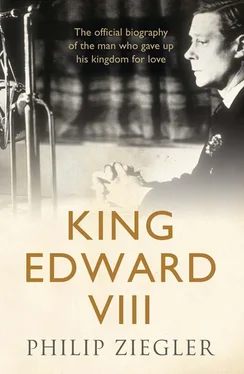In the middle of the nineteenth century Bagehot had written perceptively of what was now the Prince’s problem: ‘Whatever is most attractive, whatever is most seductive, has always been offered to the Prince of Wales of the day, and always will be. It is not rational to expect the best virtue where temptation is applied in the most trying form at the frailest time of human life.’ 7The Prince had done no more than taste the flavour of the fleshpots before the war, there had followed four years of dour privation, now everything was his for the taking. If his life had developed as had been expected in 1914 he would have had time to adjust to the heady and dangerous delights of liberty. As it was, he was almost entirely inexperienced. In 1921 he told Freda Dudley Ward that he had been reading Max Beerbohm’s essay on King George IV. 8‘I’ve found a sentence in it that I think must be amazingly suitable and applicable to me and somewhat an apology for my doings and behaviour … “He was indeed still a child, for royalties not being ever brought into contact with the realities of life, remain young far longer than other people.” No one realizes how desperately true that is in my case [more] than I do.’ 9When he surveyed the monstrous banquet of pleasures which the world laid in front of him, and the unsubstantial restraints placed upon his capacity to gratify himself, he might have been inclined to cry with Clive that he stood astonished at his own moderation.
‘I think David ought to return home before very long,’ wrote Queen Mary to the King three weeks after the armistice, ‘as he must help us in these difficult days.’ 10In a letter that must have chilled the Prince’s heart, Lord Stamfordham sketched out the sort of help that was in question. The King had decreed he should take over the Presidency of the King Edward VII’s Hospital Fund. ‘Then there is the Royal College of Music. The University of Wales is the most pressing as the King really constitutionally ought not to be the Chancellor. Then Your Royal Highness is to be elected a Trustee of the British Museum.’ 11And so the dismal catalogue went on.
The first essential was to find him a private secretary. Lord Cromer, a former diplomat and banker turned courtier, was the Prince’s original choice, but the King ruled that he could not be spared from his present duties. Next to be canvassed was a former journalist and much-decorated officer in the Brigade of Guards, Edward Grigg, who seemed to accord admirably with Stamfordham’s prescription: ‘someone with brains, with some Colonial knowledge: a facile pen – a nice fellow …’ 12Grigg, however, hankered after a career less restricted than he would find in royal service. Eventually the job went to Godfrey Thomas, whose diplomatic career had already been interrupted by the Prince’s demands on his time. In his diary the Prince described Thomas as a ‘topper’ and a ‘ripper’ and he wrote to him as ‘my greatest friend and the one man I can trust and who really understands me’. 13It was perhaps a feeling that the two men were too close to each other that led the King to question the wisdom of the appointment. The Prince stuck to his guns. Thomas was ‘ very able, full of tact, and popular with everyone … in addition to never hesitating to point out or tell me of any failings he may think I am guilty of’. 14It proved a good choice. A stronger personality than Thomas might possibly have curbed some of the Prince’s excesses, but more probably the two men would have quarrelled and greater mischief been done than good. Thomas served his master with loyalty and devotion until the abdication.
With a private secretary came an independent household. The Prince insisted that, at twenty-five, he could no longer live under his parents’ roof. ‘I must be free to live my own life,’ he told Lady Airlie. 15The King took the line that the roof of Buckingham Palace was quite large enough for two – or twenty for that matter – but he grudgingly gave way and in July 1919 the Prince moved into York House, not so much a house in fact as a fragment of the great complex of St James’s Palace, which grew or shrank according to the needs and pretensions of the occupant. It was not ideal, few good rooms and those north-facing, dark, antiquated, but it suited the new owner’s needs and gave him the privacy and independence he so much desired.
And so, in his new premises, he set up in business as Prince of Wales. Lloyd George still presided over a coalition government elected with a large majority at the end of 1918, but though his personal prestige was high the overwhelming Conservative preponderance in the alliance meant that his position was far less strong than it seemed. The Prince’s views at the time of the election were much as might have been expected from a serving officer: ‘One dreads to think of the Labour people returning a greater number of members … and then all these crazy women candidates; however Lloyd George seems to be all right just now, tho’ one can’t trust him a yard.’ Wigram had been sending him the Scotland Yard reports on the state of opinion among the working classes and he read them with alarm: ‘I’m afraid I’m always a pessimist but the situation looks pretty black just now, tho’ it’s not half as black as it will be in a year’s time, perhaps less than that.’ 16The problems were going to start when the soldiers were demobilized and expected employment and a decent standard of living. Only radical action could avert disaster: ‘Oh! we’ve got funny, or, rather, serious times before us, but they’ve got to be faced and in the right and proper way and to hell with precedents!! They won’t wash nowadays!!’ 17He agreed wholeheartedly with his mother when she rejoiced at the defeat of the more extreme socialists in the general election and concluded her letter: ‘If only the Coalition Govt will now hurry up and get the much needed reforms (which the working classes need) passed, they can take the wind out of the sails of the extremists, and I trust they will be wise enough to realize it.’ 18
He returned to a Britain that was riven by class antipathies and violent industrial disputes. ‘One can’t help seeing the work people’s point of view,’ he told the Queen, ‘and in a way it’s only human nature to get as much as one can out of one’s employer.’ 19He soon found that he sympathized with Lloyd George and the more radical wing of the government and resented the intransigent callousness of the hard-faced men who had done well out of the war. ‘I look on [Lloyd George] as the only possible man living to be PM and feel that if he goes a Labour govt is bound to come in. I have the greatest confidence in him now, tho’ I didn’t use to!!’ 20That the accession to power of a Labour government would be an evil seemed as obvious to him as it did to 99 per cent of the upper classes, but that the injustices of society required drastic redress and that, if nobody else would do it, it would have to be done by the socialists, seemed quite as evident. ‘It is a very sad and depressing thought that there are so many desperately sad and sordid homes this Christmas,’ he wrote in 1921, ‘destitute men (thousands of them ex-service men) and consequently still more starving women and children.’ 21Such sentiments are easily voiced, but less easily acted on. The Prince of Wales was no crusader and was disinclined to concern himself with any problem which was not thrust forcibly on his attention. But the unemployment and destitution among so large a part of the population were thrust on his attention, and the issues preoccupied him for many years.
In June 1919 he made the first of the provincial tours which were to be so conspicuous a feature of his public life and were to give him a deeper understanding of British industry and working men than any monarch or heir to the throne had enjoyed before him. He spent four days in south Wales, was taken through the least salubrious slums, and in his speeches laboured constantly ‘the welfare of our ex-service men and the improvement of housing conditions, both of which I have very much at heart’. He went down Cymmr pit in the Rhondda Valley and found chalked on a wall a thousand feet down: ‘Welcome to our soldier Prince. Long may he live.’ He borrowed a piece of chalk and wrote below the slogan: ‘Thank you. Edward, Prince.’ 22
Читать дальше












